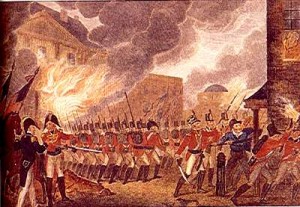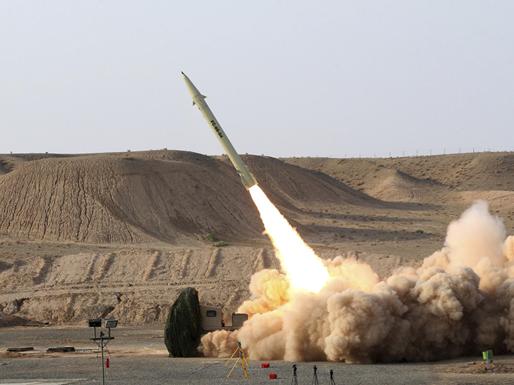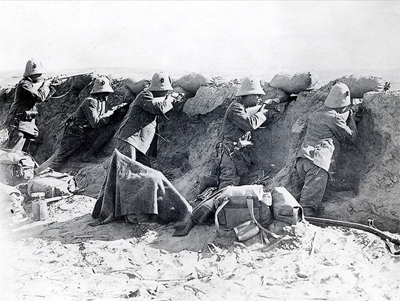Looking at a possible Iran War in 2012 with a look back at 1812 and 1912
By Roger Lee, The History Guy
New Year’s Day, 2012, opened with Iran’s announcement that Iranian nuclear scientists had produced Iran’s first nuclear fuel rod and that the Iranian navy had test-fired a new medium-range surface-to-air missile. All this while Iran conducted war games in the Strait of Hormuz designed to test its ability to close those straits to international oil shipping. All this while the U.S. and the other Western powers continue to declare that they will not allow a disruption to the oil shipping, and Israel watches nervously and prepares for war.

Iranian war games in the Strait of Hormuz
As the world seems to quickly slide toward war, n look back at events 200 and 100 years ago seems in order. 2012 marks the bicentennial of the War of 1812, in which the U.S. took on the much more powerful British Empire and managed to survive to talk about it. In 1912, the world was on the brink of a devastating World War, which was still two and a half years away, but events in 1912 set the stage for a war that everyone thought would be quick and sharp, but proved to be out of everyone’s control as soon as it began.
In 1812, the world was in the throes of an earlier version of world war, with Britain, Russia, Spain, and other nations in a death-match with Napoleon’s French-dominated empire. The United States did not have a dog in that fight, so to speak, but had long-standing problems with the British. Ever since the American Revolution, the Americans felt that Britain did not respect the U.S. as a true sovereign nation. British agents aided the Native Americans who resisted American encroachment along the frontier, and British ships regularly disrespected American shipping on the high seas, leading to violent naval confrontations and the forcible boarding of U.S. ships to “impress,” or illegally (in the U.S. view) draft sailors into the British navy. The United States basically felt they had to put up or shut up in terms of their problems with Britain. Also, some expansionist elements in the government and elsewhere eyed the prospect of invading and “liberating” Canada from the British.
Thus, a somewhat naïve and woefully unprepared America declared war on the most powerful nation on earth and commenced to invade British Canada. Long story short, the U.S. got it’s rear-end kicked out of Canada and throughout most of the eastern seaboard by the British. Not until the Battle of New Orleans in 1815, could the U.S. claim any meaningful victory on land.
How does this situation relate to the current tension with Iran? In this case, in 2012, the smaller nation feeling no respect is Iran, and the most powerful nation in the world is obviously the U.S. Some analysts, and some Iranian spokesmen themselves, say that if Iran is pushed around too much (sanctions, U.S. drone flights, covert warfare, assassinations, etc.), it may retaliate by closing the Strait of Hormuz to international shipping, which would be a cassus belli for the Western Powers. Of course, the fact that Iran is clearly pursuing nuclear weapons makes Israel and the West quite nervous, and if Israel truly believes that Iran is close to getting The Bomb, then war is likely inevitable. One thing about the War of 1812 that applies to this situation is that when the U.S. chose war with Britain (and with Canada), the assumption was that the war would be quick, and that Britain was too distracted by its other wars to put much effort into another war. Iran may be thinking the same thing, to everyone’s detriment.
The situation in 1912 was a bit different. The former major power in the eastern Mediterranean region, the Ottoman Empire (also known as Turkey), was fading fast, and the vultures were beginning to gather to pick at the soon to be expired Ottoman carcass. Italy attacked Ottoman Libya in 1911, and in October, 1912, the Ottomans sued for peace and gave up their last piece of territory in North Africa. The day following the conclusion of the Italian-Ottoman War, the Balkan alliance of Serbia, Greece, Montenegro, and Bulgaria launched an attack on the Ottoman possessions in Europe. The Ottomans lost that war, but that First Balkan War, and a Second Balkan War that broke out right after the first one, helped set the stage for World War One, which erupted in the summer of 1914. In the wars of 1912, we see several smaller nations take on the ancient bogeyman from their past; no longer strong, but feeble and weak. And the little guys won. In the modern era, the little guys can be seen as Saddam’s Iraq, Khaddafy’s Libya, Assad’s Syria, Iran, and North Korea. They all have a bad history with the Western powers. They all, at one point or another, had challenged the West, and survived those initial conflicts. But they took that feeling of victory and invulnerability too far, challenged the West one too many times, or refused to bow down when faced with invasion and war. Saddam is now dead. Khaddafy is dead. Assad is under siege, and North Korea is still the great unknown. Iran is the linchpin. If they truly see themselves as the relatively small but tough challenger to U.S, and Western influence in the Muslim world, then they may push the envelope enough to cause a military response from either Israel or the U.S.

Unintended Consequences of War: The British Burn Washington
In the 1912 analogy, the smaller nations were victorious initially, but when the big dogs got into the fight beginning in 1914, Serbia, and Montenegro were almost destroyed. Bulgaria lost even more land. The war did not go as any of them anticipated, which is usually the way of war. The same held true in the War of 1812. The U.S. expected a fairly easy war against the British in Canada, and instead, the Americans saw their own nation invaded and Washington, D.C burned down by the invaders. In both examples from 100 and 200 years ago, the little guys faced down against the big guys, and once war started, it went in directions no one wanted or anticipated. If a war with Iran is in store for 2012, the decision-makers on all sides need to keep that historical fact in mind before it is too late.






